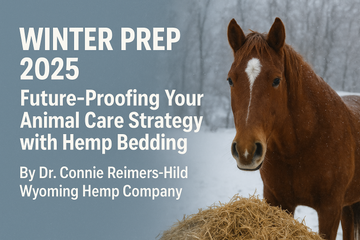By Dr. Connie Reimers-Hild, PhD, CPC at the Wyoming Hemp Company
As autumn temperatures drop across the Mountain West and Great Plains, animal owners face a familiar challenge: preparing for months of cold-weather animal care. Whether you're caring for horses, cattle, sheep, goats, pigs, alpacas, llamas, chickens, ducks, rabbits, guinea pigs, chinchillas, hamsters, or other beloved animals, 2025 marks a pivotal moment in how forward-thinking animal and pet owners approach winter bedding strategies. The question is no longer just "What bedding keeps animals comfortable?" but rather "What bedding system creates resilience for the seasons ahead?"
The answer increasingly points to industrial hemp bedding—and for reasons that extend far beyond winter warmth.
The Hidden Cost of Traditional Winter Bedding
Traditional winter livestock bedding materials—wood shavings, straw, and sawdust—have served animal care for generations. But as any experienced barn manager knows, winter amplifies every weakness in your bedding system:
Moisture becomes the enemy. Cold weather means closed barns, reduced ventilation, and moisture that has nowhere to go. Wet bedding creates ammonia buildup, respiratory issues, and thrush in horses. It also means you're moving more material, more often—just when frozen ground and winter weather make that physically harder.
Dust becomes dangerous. Winter confinement means animals spend more time in enclosed spaces breathing whatever particulates their bedding releases. For horses prone to respiratory conditions, this isn't just uncomfortable—it's a health crisis waiting to happen.
Supply chains become unpredictable. We've learned hard lessons about supply chain fragility over the past few years. Winter storms, transportation delays, and regional shortages can leave you scrambling for adequate bedding when animals need it most.
The total cost of winter bedding isn't just your invoice—it's your labor, your animals' health, your facility's air quality, and your peace of mind when the next winter storm hits.
Why Hemp Bedding is Different (And Why It Matters More This Winter)
Industrial hemp bedding represents a fundamental rethinking of what bedding should do. While traditional materials simply provide a surface, hemp bedding creates a system—one that actively improves the winter stable environment.
Absorption That Changes the Equation
Hemp hurd (the woody core of the hemp plant) can absorb up to 4 times its weight in moisture—significantly outperforming wood shavings. But the real advantage isn't just absorption capacity; it's what happens after absorption.
Hemp bedding locks moisture away rather than allowing it to sit on the surface. In practical terms, this means:
-
Drier stalls even with reduced winter ventilation
-
Dramatically lower ammonia levels
-
Less frequent mucking (critical when you're dealing with frozen manure carts and icy barn aisles)
-
Healthier hooves, particularly for animals prone to thrush
Wyoming Hemp Company's customers report increased animal warmth and reductions in ammonia smells, mites, and respiratory issues after using our hemp bedding. They also love to use it when it rains or when the snow thaws. It absorbs so much moisture that you and your animals don't have to trudge in the mud!
The Low-Dust Advantage in Confined Spaces
Winter means your animals spend more hours inside. Whether you're managing horse stalls, cattle barns, sheep pens, goat housing, pig facilities, chicken coops, duck enclosures, rabbit hutches, guinea pig cages, chinchilla habitats, hamster enclosures, gerbil cages, ferret spaces, or hedgehog homes, indoor air quality directly impacts respiratory health. Wyoming Hemp Company uses a proprietary processing method to create bedding that is 99% dust-free, so it is healthier for animals and their owners.
This isn't just about comfort. Respiratory inflammation in animals can trigger or exacerbate conditions like heaves (recurrent airway obstruction) in horses, respiratory infections in poultry, and breathing difficulties in small pets. These conditions decrease performance and create long-term health complications. The cost of treating respiratory issues far exceeds any premium in bedding choice.
Natural Odor Control Through Antimicrobial Properties
Hemp contains naturally occurring antimicrobial compounds. While traditional bedding simply masks odors temporarily, hemp bedding actively inhibits the bacterial growth that creates ammonia and foul odors in the first place.
For winter barn and enclosure management, this means healthier air for both animals and the humans caring for them. It also means your facility doesn't smell like a barn when you're running a boarding operation or trying to maintain property values.
The Composting Advantage: Thinking Beyond Winter
Here's where systems thinking separates reactive management from strategic foresight: What happens to your bedding after you remove it from the stall?
Traditional winter bedding creates a massive waste management problem. Wet, heavy, slow to break down—wood shavings and straw can take years to compost properly. Many operations end up with mountainous manure piles that become environmental liabilities and community relations problems.
Hemp bedding composts in as little as 8-12 weeks. By spring, your winter bedding waste has transformed into valuable organic matter you can return to pastures or sell to gardeners. Some progressive operations are already building revenue streams around composted hemp bedding.
This circular approach isn't just environmentally responsible—it's economically smart. You're not managing waste; you're creating soil. That shift in perspective matters for both your bottom line and your community relationships.
The Strategic Foresight Case: Why Hemp Now
The decision about winter bedding isn't just operational—it's strategic. Several converging trends make hemp bedding adoption a forward-looking move:
Supply chain resilience is the new competitive advantage. Hemp grown and processed regionally (like Wyoming Hemp Company's products) means shorter supply chains, more predictable availability, and reduced vulnerability to distant disruptions. When the next winter storm hits, you're not dependent on transportation from the Pacific Northwest or Canada.
Regulatory environments are shifting. As environmental regulations around agricultural waste tighten, composting capability moves from "nice to have" to "must have." Hemp bedding positions you ahead of this curve.
Consumer preferences are evolving. If you run a boarding facility, training operation, or agritourism business, sustainability messaging matters to your customers. Hemp bedding isn't just a product choice—it's a story about regenerative agriculture, environmental stewardship, and animal welfare that resonates with 2025 consumers.
Labor efficiency matters more than ever. With ongoing labor challenges in agriculture, any system that reduces physical work without compromising animal welfare creates competitive advantage. Less mucking, easier handling, and reduced dust exposure all make hemp bedding attractive to the people doing the daily work.
Making the Transition: A Practical Roadmap for Winter 2025
If you're considering hemp bedding for this winter, here's a strategic approach:
Start with a test area. Choose your most challenging stall—perhaps a horse that paws constantly, or a stall with drainage issues. Run a side-by-side comparison through December. Track your labor hours, bedding usage, and animal comfort indicators.
Calculate total cost of ownership, not just unit price. Yes, hemp bedding may cost more per bag than shavings. But factor in:
-
How much bedding you're actually using per stall per week
-
Labor hours saved on mucking and manure management
-
Reduction in respiratory treatments and hoof care issues
-
Value of composted material in spring
-
Reduced disposal costs
Most operations find hemp bedding cost-competitive or cost-saving when calculating total system costs.
Order early and stock up. Supply chains for agricultural products can tighten during winter. Work with Wyoming Hemp Company to establish delivery schedules that ensure you're never scrambling for bedding mid-January.
Document your results. Track data on bedding usage, animal health indicators, and labor hours. This documentation serves multiple purposes: it validates your decision, helps optimize your system, and provides compelling evidence if you're making the case to business partners or facility owners.
Regional Sourcing Matters: The Wyoming Advantage
When you choose Wyoming Hemp Company's hemp bedding, you're not just selecting a product—you're investing in a regional agricultural system. Hemp grown in Wyoming's high-altitude climate, processed locally, and delivered within the Mountain West region represents the kind of decentralized, resilient supply chain that makes sense in an uncertain world.
This matters for winter preparation. Shorter transportation distances mean more reliable delivery during weather events. Regional production means you're supporting agricultural diversification in your own community, building the kind of economic resilience that benefits everyone.
The 2025 Winter Challenge: Why Forward-Thinking Animal Owners Are Switching to Hemp Bedding
From large livestock operations managing horses, cattle, sheep, goats, pigs, and alpacas to small animal owners caring for rabbits, guinea pigs, chinchillas, hamsters, gerbils, ferrets, hedgehogs, and other pets, forward-thinking animal caregivers are making the switch to hemp bedding. Poultry farmers raising chickens, ducks, geese, turkeys, and quail are also discovering the superior performance of hemp bedding in coops and runs.
As you prepare for winter 2025, the question isn't just "What bedding should I use?" It's "What kind of operation am I building for the decade ahead?"
Hemp bedding answers that question with a clear vision: healthier animals, more efficient operations, environmental responsibility, and regional economic resilience.
The cold is coming. It's time to prepare for the weather and the future!
Ready to Make the Switch?
Wyoming Hemp Company offers premium industrial hemp bedding sourced from American-grown hemp and processed right here in the Mountain West. Whether you're managing horse barns, cattle operations, sheep or goat facilities, pig farms, alpaca ranches, chicken coops, rabbit hutches, guinea pig habitats, or caring for any other animals large or small, we can help you calculate the right amount of bedding for your winter needs and design a delivery schedule that works for your operation.
Contact us to learn more about winter pricing, bulk ordering options, and how other operations in your region are successfully using hemp bedding for their horses, livestock, poultry, and small pets. Let's build a better winter and future—together.
PS: It's the perfect time to prep your garden and pots for winter too. Try our Hemp Guard Mulch to get your precious plants through the winter!
Dr. Connie Reimers-Hild is a futurist and strategic foresight expert. She works as part of the Wyoming Hemp Company team and helps translate emerging trends into practical strategies for those who are ready to lead rather than follow.

